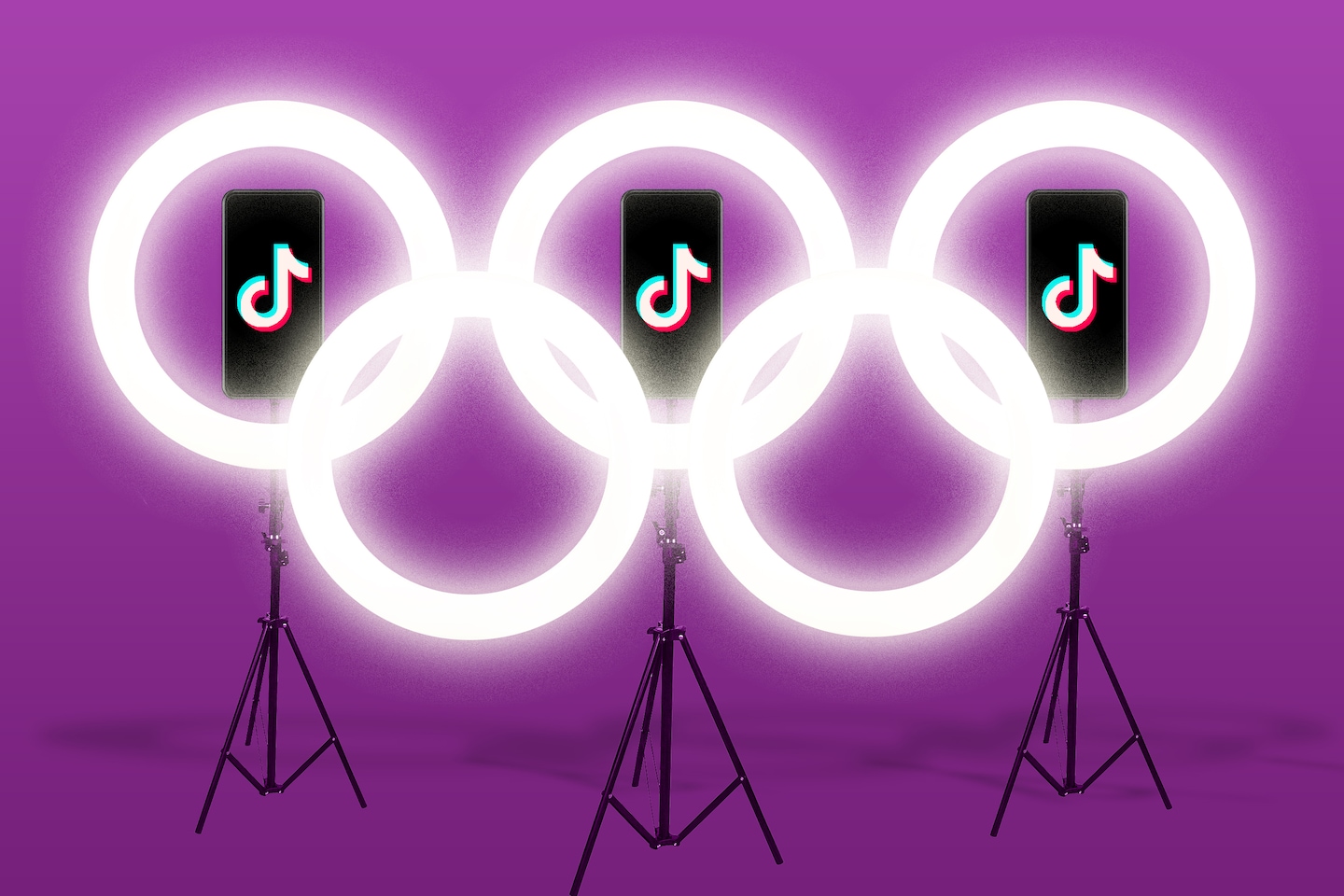Official Olympic coverage tells us who wins. TikTok tells us everything else.

TikTok, a Chinese social media app that shot to popularity in the United States in 2018, earned a reputation as the place for behind-the-scenes Olympic content during the 2021 Summer Games in Tokyo. Now, at the Winter Olympics, viewers are flocking to watch less polished videos on the social media platform, whether that’s athletes getting their daily throat swabs for covid, robots disinfecting hallways or facial recognition technology able to identify athletes with their masks on. TikTok has plenty of glimpses into life at the Olympics — along with some weirder content from athletes and audiences.
TikTok saw 1.7 million installs in the United States from Feb. 4 to 12, according to data from Sensor Tower, compared with 1.1 million for Instagram and 1 million for YouTube. At the same time, NBC, which owns the U.S. broadcast rights to the Winter Olympics, saw viewership drop for the Opening Ceremonies, compared with previous Games. That might be because it’s simply more fun to hear people’s takes on the Olympics than to watch the events themselves, Mahrer said.
Some commenters said Mahrer’s videos, a few of which she said climbed to about 1 million views on TikTok before disappearing from the platform because of copyright infringement, are disrespectful and oversexualized. Others felt seen.
“This is exactly how my friends and I would commentate,” one user wrote.
Commentators on NBC are often former athletes with deep knowledge of the events, but people at home aren’t sure what to make of what’s happening, Mahrer said, and hearing a normal person give their impressions is refreshing. Combine that with TikTok’s algorithm, which boosts popular content to friends and strangers alike, and the short-form video app wins out over more formal coverage, she said.
“The Olympics are just absurdly out of reach for most humans. There just isn’t much you can relate to about it,” Mahrer said. “If you put some humor to it or show normal people reacting to it, people are like, ‘Oh, my God, I had that same thought.’ ”
Some unauthorized clips get taken down; others stay up and get hundreds of thousands of views.
A TikTok spokeswoman said it’s working with NBC and the International Olympic Committee (IOC) to take down any unauthorized content. NBC, which has its own accounts on TikTok as well as an Olympic deal with the platform, said that it has partnered with the IOC to protect its rights and that “infringing viewership” is small, compared with “streaming minutes that will be legitimately consumed.” The IOC did not respond to a request for comment.
Making videos on TikTok has allowed athletes to share more of themselves — not to mention exclusive areas like Olympic dining halls — than they can on broadcast TV, but that doesn’t mean there aren’t limits. China’s Olympic organizing committee warned foreign athletes against criticizing Chinese policies, and many athletes brought burner phones to protect their digital data from potential surveillance. Because of that tension and vague IOC rules that limit athletes’ social media sharing to posts that are “dignified and in good taste,” many stick to safe videos like walk-throughs of their dorm rooms. But others talk about sexism, fear of the future and having to poop.
Here are some of the most popular, strange and vulnerable TikToks to come out of the Winter Olympics this year.
After comedian and former “Saturday Night Live” cast member Leslie Jones had some Olympic commentary videos taken down, she announced she would stop making them. Soon after, NBC said the takedowns were a mistake and that Jones can continue sharing Olympic clips on TikTok and other social media sites. Here’s Jones’s (profane) take on the luge, a high-speed sledding event.
Ski jump practice or a tribute to the 1987 film “Dirty Dancing”? According to teenage Australian snowboarder Valentino Guseli, it’s hard to tell.
This clip of an Olympic ceremony participant getting wrapped up in a flag has more than 42 million views.
For U.S. snowboarder Maddie Mastro, staring down the Olympic pipe was a little, um, gut-wrenching.
U.S. luge competitor Jonny Gustafson just wants to know where to find alcohol. (For anyone confused by his reference, /srs and /j are Internet “tone indicators” for when it’s tough to know whether someone is serious or joking.)
Estonian freestyle skier Kelly Sildaru put footage of what appears to be intense coronavirus precautions at the Olympics over “The Imperial March” from Star Wars. (The one that plays when Darth Vader shows up.)
“First successful day with stormtroopers at the Olympics,” her caption reads, as what looks like sanitation workers in full personal protective equipment spraying sanitizer on floors and walls.
In this video that has been viewed a million times, skin care influencer @benjaminccao compares the traditionally masculine and feminine costume styles of figure skaters Nathan Chen and Yuzuru Hanyu, asking whether viewers think Chen is guilty of “toxic masculinity” in the way he presents himself.
“Instead of grass, make everything snow.” Here, comedian Jimmy Rees imagines a brainstorm session for the first-ever Winter Olympics.
Jenise Spiteri, a snowboarder representing Malta at the 2022 Games, says she waited 12 years for the opportunity to fire back at people who attacked her snowboarding skills on the Internet.
U.S. luge athlete Summer Britcher tapped into the universal psyche (and Jane Austen fandom) with this post-Olympics TikTok: “I’m 27 with no money and no prospects.”
Anna Hoffmann, a ski jumper on the U.S. team, called out the Olympics for making female ski jumpers use a different-sized hill than men, despite practicing on the same hills during training, she says.
U.S. figure skating coach Adam Rippon messed up by accidentally stealing skater Mariah Bell‘s Olympic credential and cellphone. Here, he walks us through the aftermath. “I might be dumb, but I am cute,” his closed captioning says.






